2023 Acura Integra Review
Acura revives the Integra nameplate, returning the car to its roots.
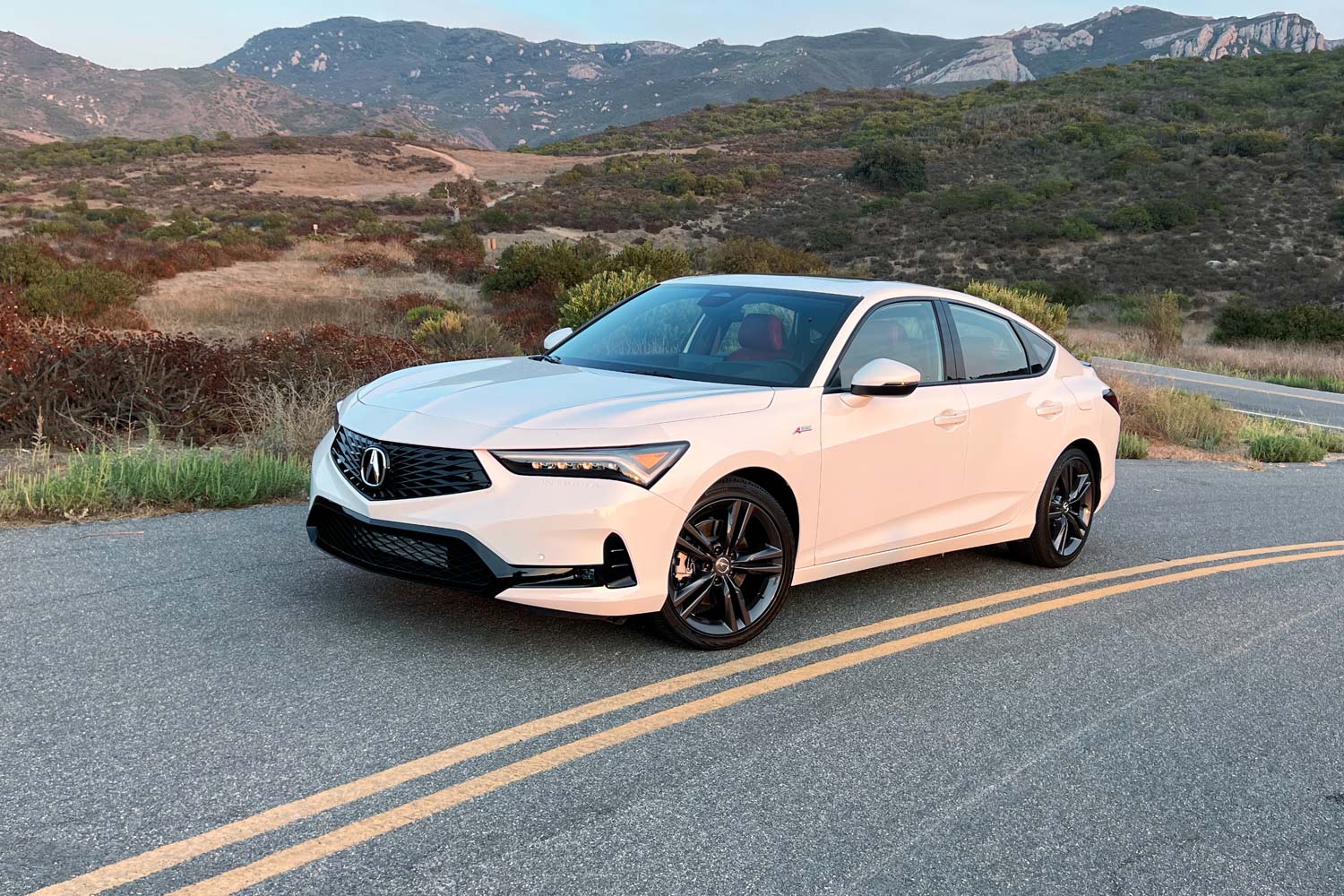 Christian Wardlaw
Christian Wardlaw
For a while there, I’d argue Acura lost its way. First, the automaker’s legendary original nameplates vanished in favor of alphanumeric designations, then the controversial “beak” appeared around the same time the iconic first-generation NSX disappeared. Acura followed up on these stumbles by canceling the sporty RSX, introducing the oddball ZDX, transforming the TSX and TL models into the TLX without a sport wagon or Type S variant for over a decade, and keeping the ILX around well past its expiration date. Acura also fell behind on the technology front and has been slow to go electric.
For decades, it has seemed like Honda’s luxury brand whipped out a couple of pistols, aimed them at its own tires, and started firing. Over and over and over again.
Fortunately, Acura is veering back onto a path it hopes will lead to renewed success. You can see it in the automaker’s design, feel it in the lineup’s engineering, experience it in the company’s revived Type S performance models, and forecast it with the upcoming Acura electric SUV. Moreover, the new 2023 Acura Integra is yet another strong signal that the automaker is returning to its roots as a Japanese performance brand.
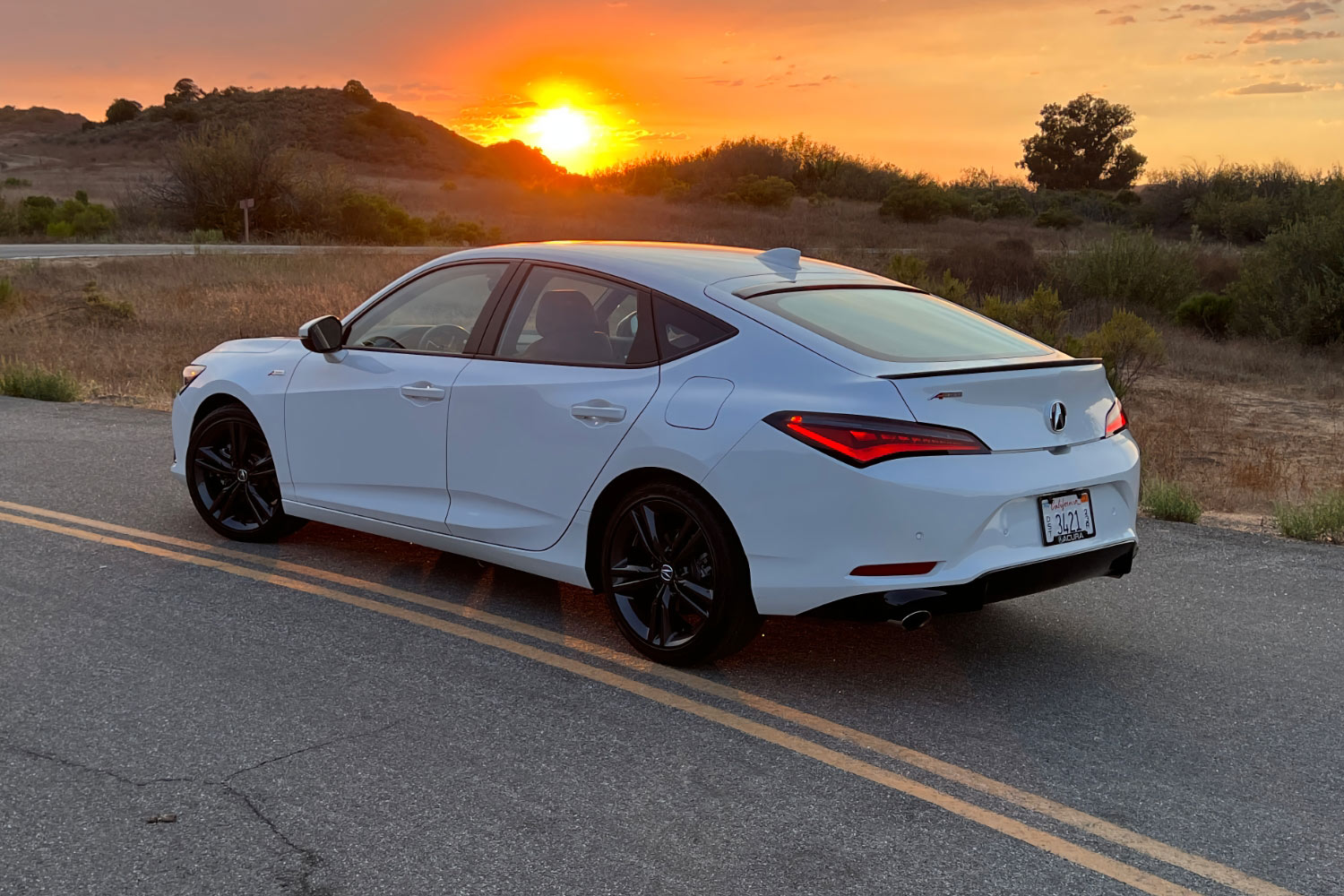 Christian Wardlaw
Christian Wardlaw
The 2023 Integra is based on the latest eleventh-generation Honda Civic (perhaps too much so), and is a five-door hatchback like the original 1986 Integra that helped establish Acura as a credible alternative to established luxury brands. Miraculously, the new Integra also comes with a manual transmission, adding as much credibility to the car with driving enthusiasts as the name adorning it. But is the revived Acura Integra the real deal or a marketing exercise solely intended to fan the flames of the brand’s revival? That’s what I wanted to find out.
For this 2023 Acura Integra review, I test-drove the A-Spec trim level equipped with the Technology package and the manual transmission. In addition, it came with extra-cost Platinum White Pearl paint and premium carpeted floor mats, bringing the Manufacturer’s Suggested Retail Price (MSRP) to $37,395, including the $1,095 destination charge. Acura provided the vehicle for this Integra review, which I conducted in Southern California.
2023 Acura Integra Review: The Design
Hatchbacks can look strange, like someone backed into a wall and scrunched the rear end. View the latest Honda Civic hatch from the side, and you’ll see what I mean. Fortunately, the Civic-based Acura Integra avoids this look thanks to a 6.8-inch sheet metal stretch. Visually, that increase of just over half a foot makes all the difference, but you won’t find gains in rear-seat legroom or cargo space over the Civic.
Generally speaking, the new Integra has a greater sense of style and presence than the Civic, which is expected. However, the doors feel and sound just as tinny as the Honda’s when you yank on the handles or slam them shut, one of several reminders that the Integra springs from humble beginnings.
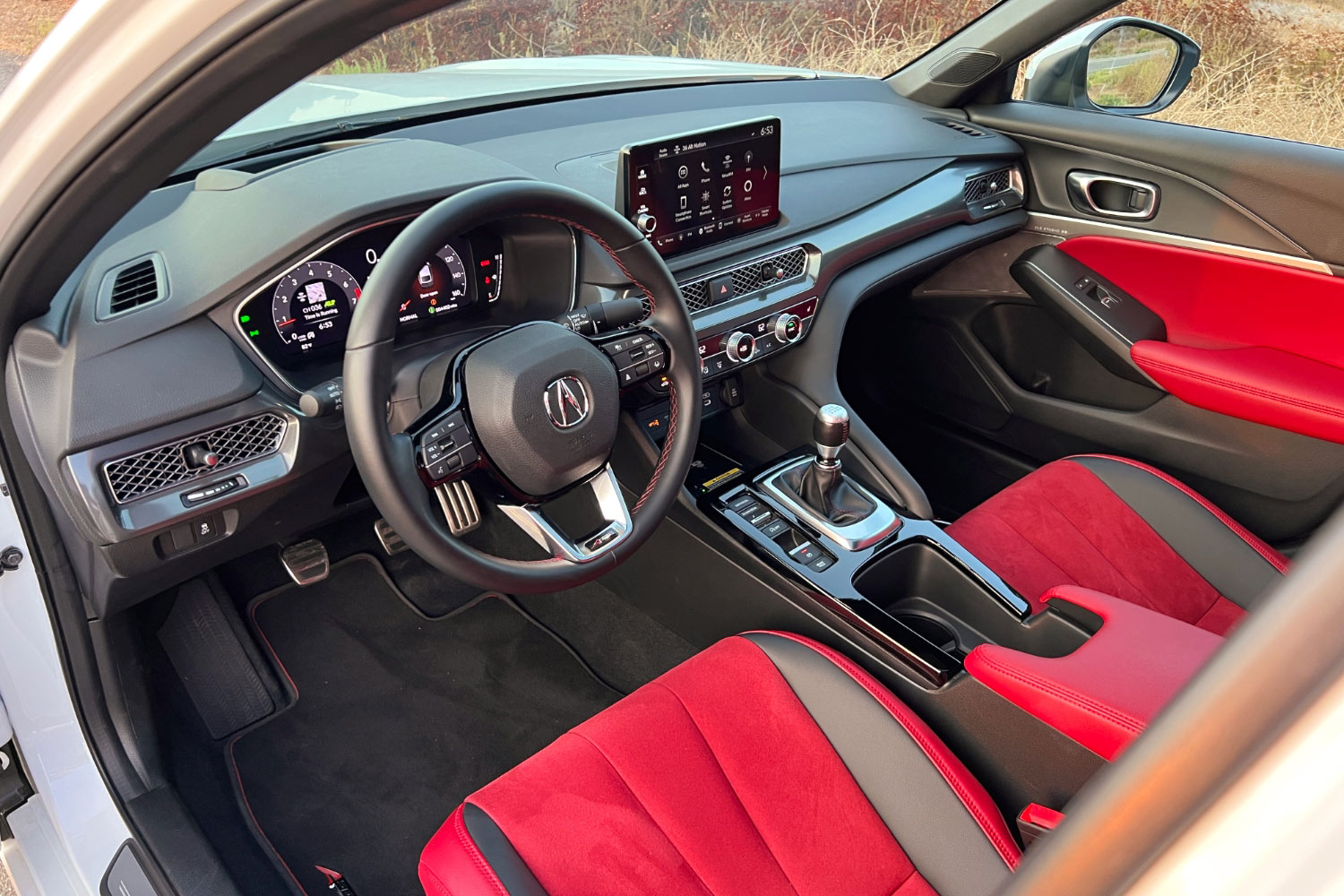 Christian Wardlaw
Christian Wardlaw
The Platinum White Pearl test vehicle had the red interior, and I think Acura could tone it down a shade or two because it is bright, bordering on tacky. But, this color and the Orchid (white) hue help to distinguish the Integra from the Civic, with which it shares its instrumentation, infotainment system, metal-mesh air vent theme, and selected switchgear. More than any Acura in recent history — even the ILX that the Integra replaces — the Honda DNA in the Integra is obvious and ever-present.
That’s fine, though, because this helps to keep the Integra’s price low. Remarkably, the more powerful Integra’s starting sticker price is only $750 more than a 2022 Civic Sport Touring hatch. That slight price disparity helps to explain the Acura’s hard plastic upper rear door panels. Still, a Mazda 3 2.5 Turbo supplies more power and a much more refined interior at about the same price as the Acura.
The Integra sits close to the ground, and the seats are mounted low in the cabin, so entry and exit require some effort. However, once drivers settle in, they’ll find a comfortable and supportive 12-way power-adjustable seat in the Integra A-Spec with the Technology package. Both front seats are heated, and a heated steering wheel is available. However, the front passenger’s seat lacks a height adjuster, which bothered my wife and made her less thrilled about our family taking the Integra anywhere.
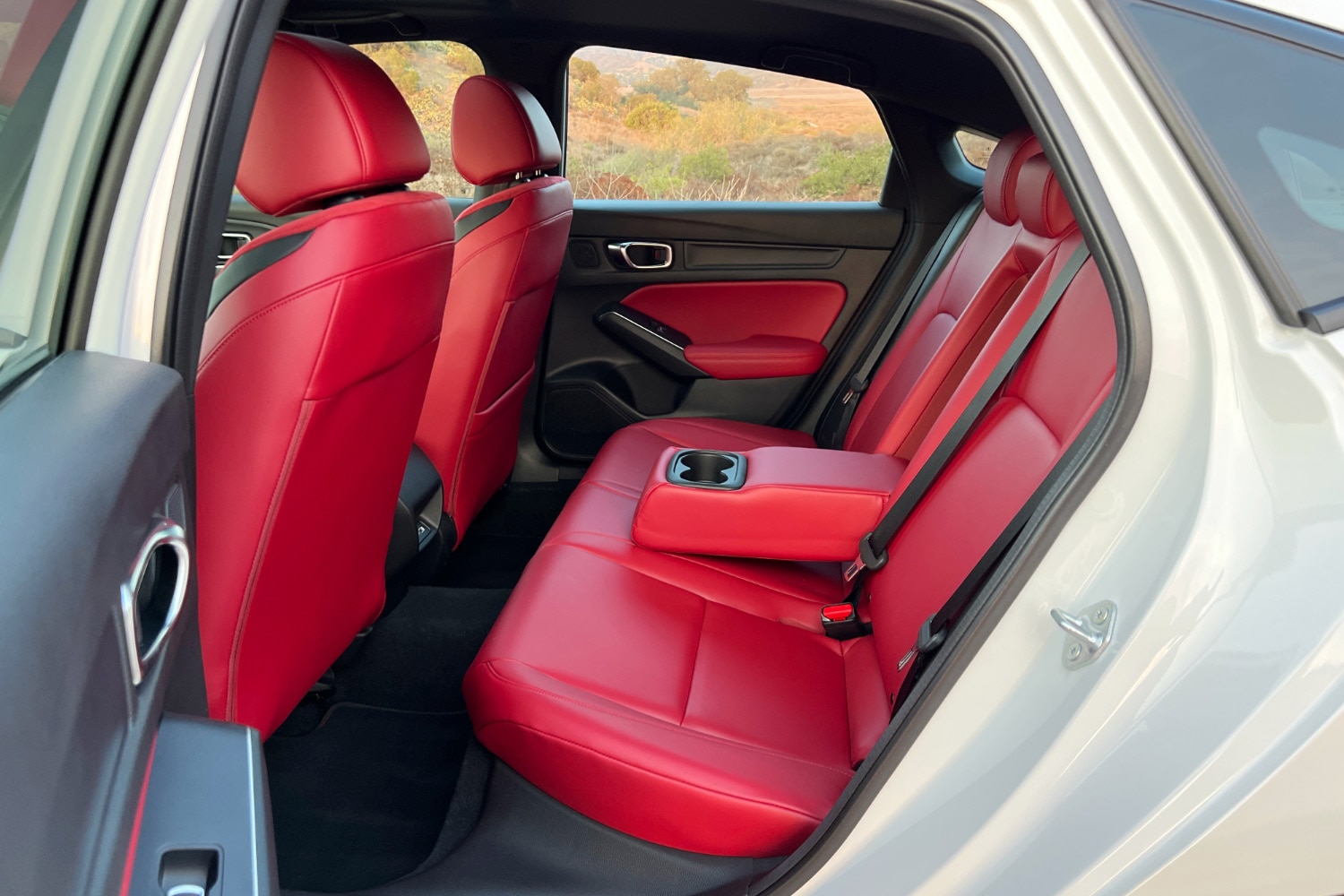 Christian Wardlaw
Christian Wardlaw
Here’s another comfort problem: the test car’s center console had padding to cushion the front passenger’s leg but did not offer the same courtesy to the driver. During the evaluation drive, my knee reminded me of the missing material with each leg brace for a tight left turn.
Additionally, Acura does not provide rear-seat passengers with air conditioning vents. That might not matter, though, because the central dashboard air vents are effective. Despite the hot, muggy weather in Los Angeles, my teenager complained about being too cold during a 45-minute trip into the city, and she was riding in the rear of the car.
Rear seat comfort is good, but the seatback is more reclined than I prefer, and headroom is barely adequate for me, a six-foot-tall person with a short torso and long legs. Legroom is favorable, though, and foot room is decent. Acura also fully upholsters the front seatback panels, so you can manage for shorter trips even if your legs are flush against them.
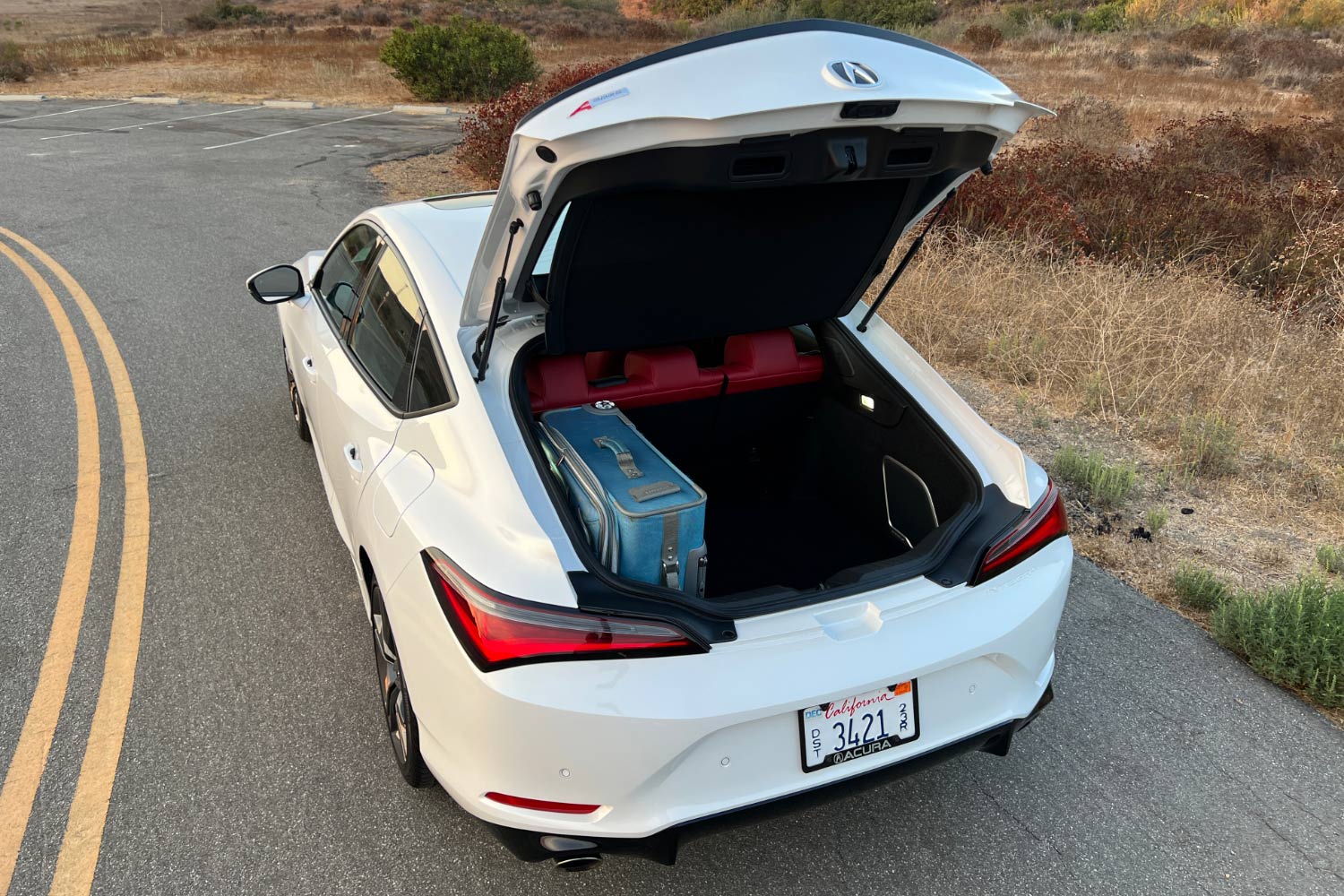 Christian Wardlaw
Christian Wardlaw
Front and rear storage space is acceptable. Unfortunately, the wireless smartphone charger takes up valuable tray space forward of the shifter. Typically, with its automatic transmissions, Acura offers a collection of buttons and switches to shift gears, but the Integra’s standard continuously variable transmission (CVT) employs a traditional PRNDL-style lever.
According to Acura, cargo space behind the back seat measures 24.3 cubic feet. That’s just shy of the Civic hatch, which provides 24.5 cu-ft of trunk room. The Integra’s liftover height is high, and the cargo cover cuts into the available volume when in use. Under the cargo load floor there are compartmentalized storage bins.
2023 Acura Integra Review: The Technology
As a point of interest, Acura elected not to incorporate its True Touchpad Interface (TTI) infotainment system in the Integra. If you’ve been in a top-trim Honda Civic sedan, you’ll recognize the 10.2-inch digital instrumentation and the 7-inch (or optional 9-inch) touchscreen infotainment systems in the Acura Integra because they’re lifted straight out of the Honda. Not that there’s anything wrong with that, because the gauge cluster is graphically appealing and, with A-Spec Technology trim, the 9-inch infotainment system is well equipped.
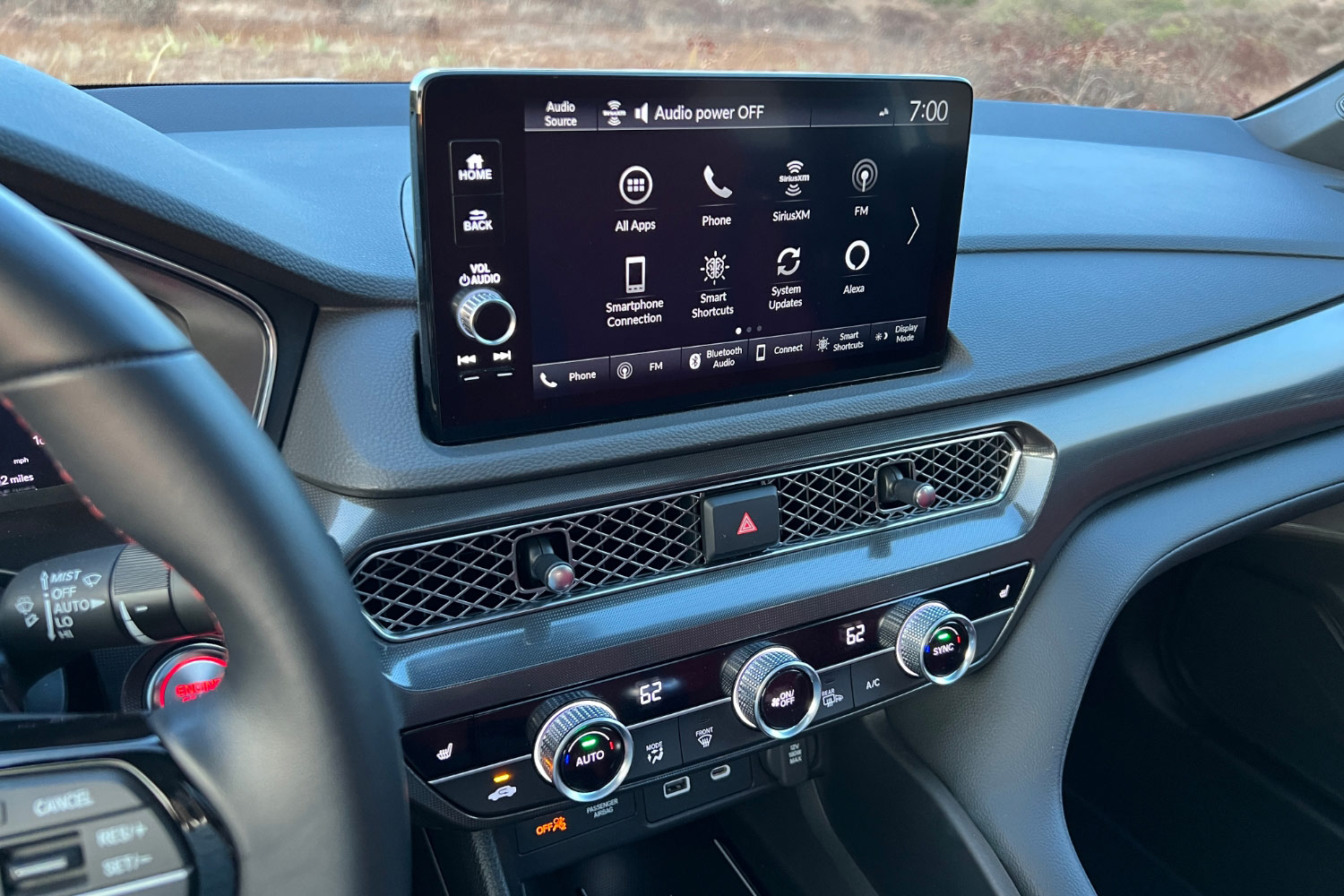 Christian Wardlaw
Christian Wardlaw
With standard and A-Spec trim, the Integra has a basic 7-inch touchscreen infotainment system with Bluetooth smartphone connectivity, wired Apple CarPlay and Android Auto, eight stereo speakers, and a single USB-A data port.
Upgrade to the A-Spec Technology trim and you get:
- A 9-inch touchscreen
- A 5.4-inc head-up display
- Wireless Apple CarPlay and Android Auto
- SiriusXM satellite radio
- A wireless charging pad
- A USB-C charge port in front
- Two USB-A charge ports in back
- A 16-speaker Acura ELS Studio 3D sound system
AcuraLink connected services are also standard with this trim, providing Amazon Alexa compatibility, access to a Wi-Fi hotspot, and more. Unfortunately, navigation is unavailable. Acura accurately assumes that you can use a connected smartphone to find your way. I attempted to use the Integra’s steering wheel Talk button, but Alexa was not set up in the test vehicle, so I could not test the voice recognition system.
In addition, I had trouble pairing my iPhone 13 Pro to the Integra’s Bluetooth. It took four tries, and even then as my device was telling me I was connected the Integra was telling me it could not connect. Eventually, this issue resolved itself and I began streaming music via Apple CarPlay. While driving in the local mountains, I lost the cell signal for a while, and the song that was playing on my Pandora app froze on the touchscreen display. It remained that way for the next hour of driving, and even after backing out to my stations list and choosing something else, which the screen confirmed was playing, no music emanated from the stereo speakers, and the frozen song and artist from the previous station remained on the screen.
Eventually, I turned the Integra off, left the car for a bit, and returned. Apple CarPlay was back to regular operation. A favorite song came on, so I cranked the volume on the 16-speaker Acura ELS Studio 3D surround-sound system. The volume level goes up to 40, but you’ll want to keep the volume at 25 or less, as I could hear some distortion above that number.
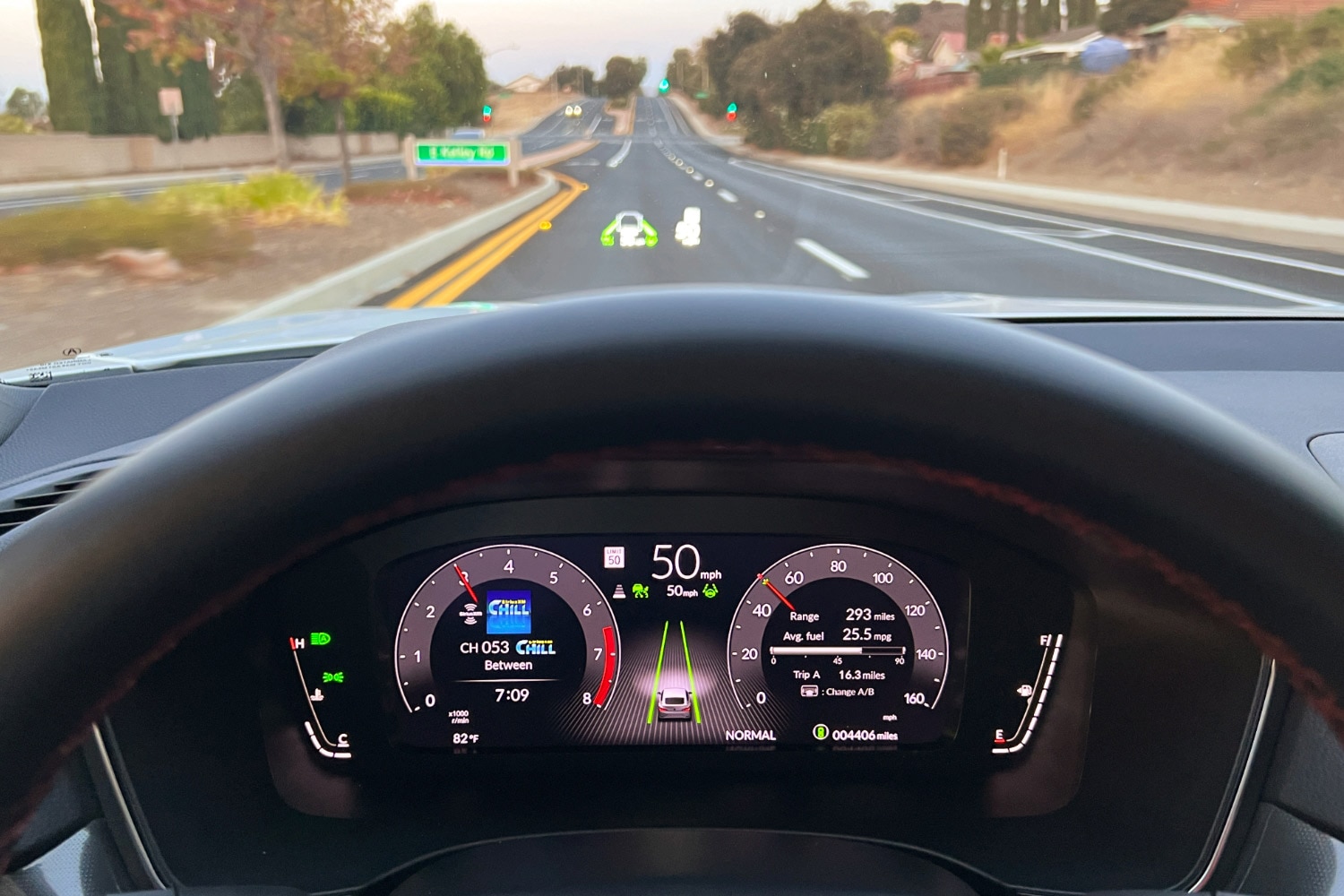 Christian Wardlaw
Christian Wardlaw
With A-Spec Technology trim, the Integra has a 5.3-inch head-up display chock full of relevant data. Better yet, it remains faintly visible when you’re wearing polarized sunglasses. It is a nice complement to the appealing graphic between the digital gauges, which shows the back of the Integra, indicates when the lights are on and when the brake lights illuminate, and displays lane-departure warnings as well as the vehicles ahead of the Acura. It has a thoughtful amount of detail.
As far as the ADAS goes, the standard AcuraWatch package equips the Integra with a slew of driving assistance and collision avoidance systems. They include:
- Forward-collision warning with pedestrian detection
- Automatic emergency braking
- Lane-departure warning
- Lane-keeping assist
- Lane-centering assist
- Traffic Jam Assist (only with the CVT)
Traffic Jam Assist combines the adaptive cruise control and lane-centering assist for semi-autonomous driving assistance at lower vehicle speeds, such as when you’re in rush-hour traffic. Since the test car had a manual transmission, I could not sample this technology, which requires the CVT.
Additionally, every Integra has:
- Blind-spot monitoring
- Rear cross-traffic alert
- Automatic high-beam headlights
- Rear-seat reminder system
- Tire Fill Assist (signals when you’ve reached the proper tire pressure)
Choose the A-Spec Technology trim, and the Integra features front and rear parking sensors with low-speed automatic braking control and rain-sensing windshield wipers.
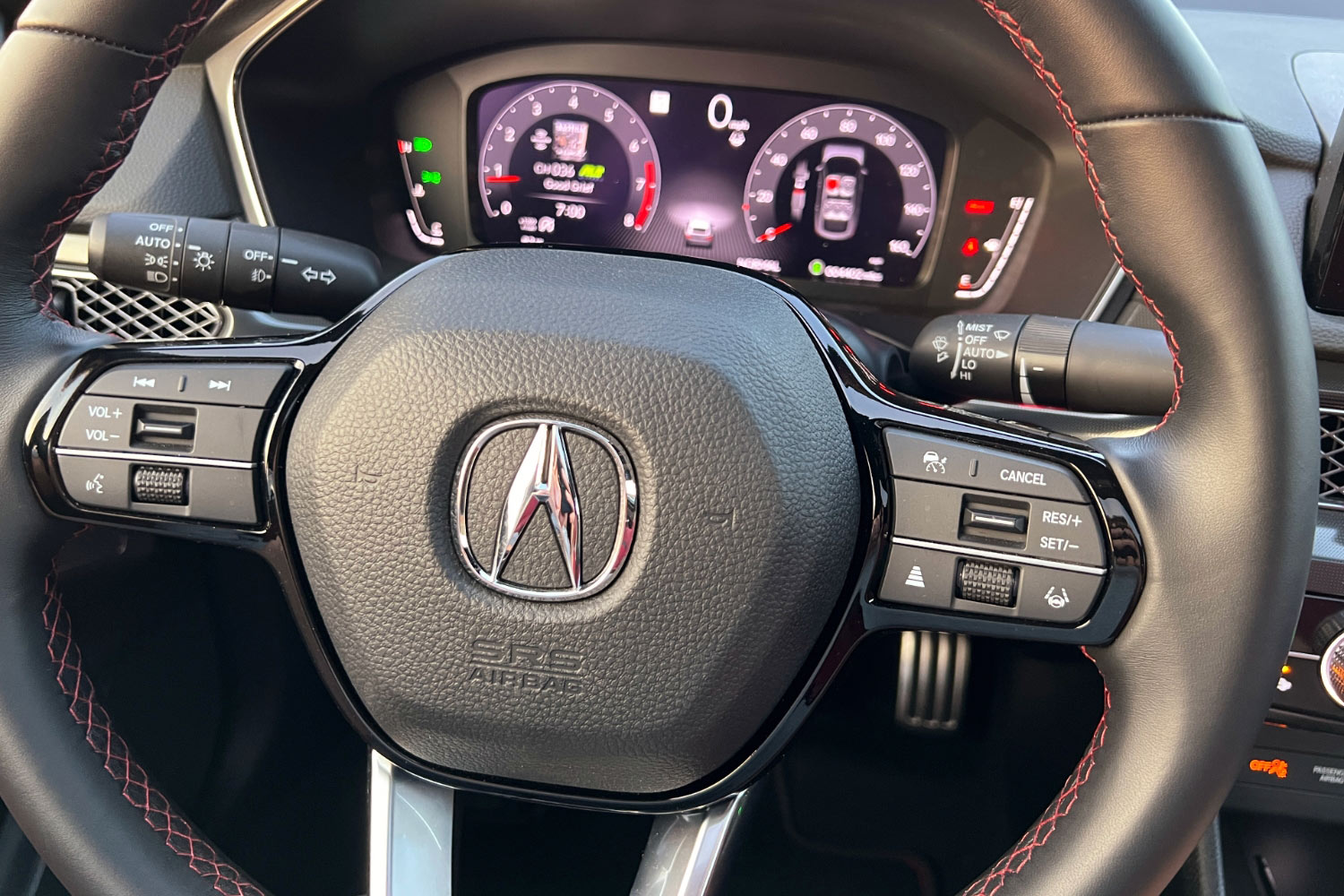 Christian Wardlaw
Christian Wardlaw
During the evaluation, the AcuraWatch systems demonstrated a fair degree of accuracy and refinement. I was especially impressed with how quickly the adaptive cruise control accelerated to get the car back up to the set speed after changing lanes to pass slower traffic.
However, on a handful of occasions, I felt like I had to override the lane-keeping assist and lane-centering assist systems. Also, the lane-departure warning emits an alert through the steering wheel that’s not quite a wobble but not exactly a vibration. Instead, it’s something in between when it should just be a strong vibration.
2023 Acura Integra Review: The Drive
The Acura Integra uses the same performance-tuned powertrain you’ll find in the Honda Civic Si sedan. However, in addition to a six-speed manual transmission, the Integra offers a CVT with paddle shifters. In the Honda, the six-speed manual is the standard and only transmission. In the Acura, the paddle-shifted CVT is standard and the manual gearbox is available only with A-Spec Technology trim, which commands a whopping $7,700 premium over the Civic Si.
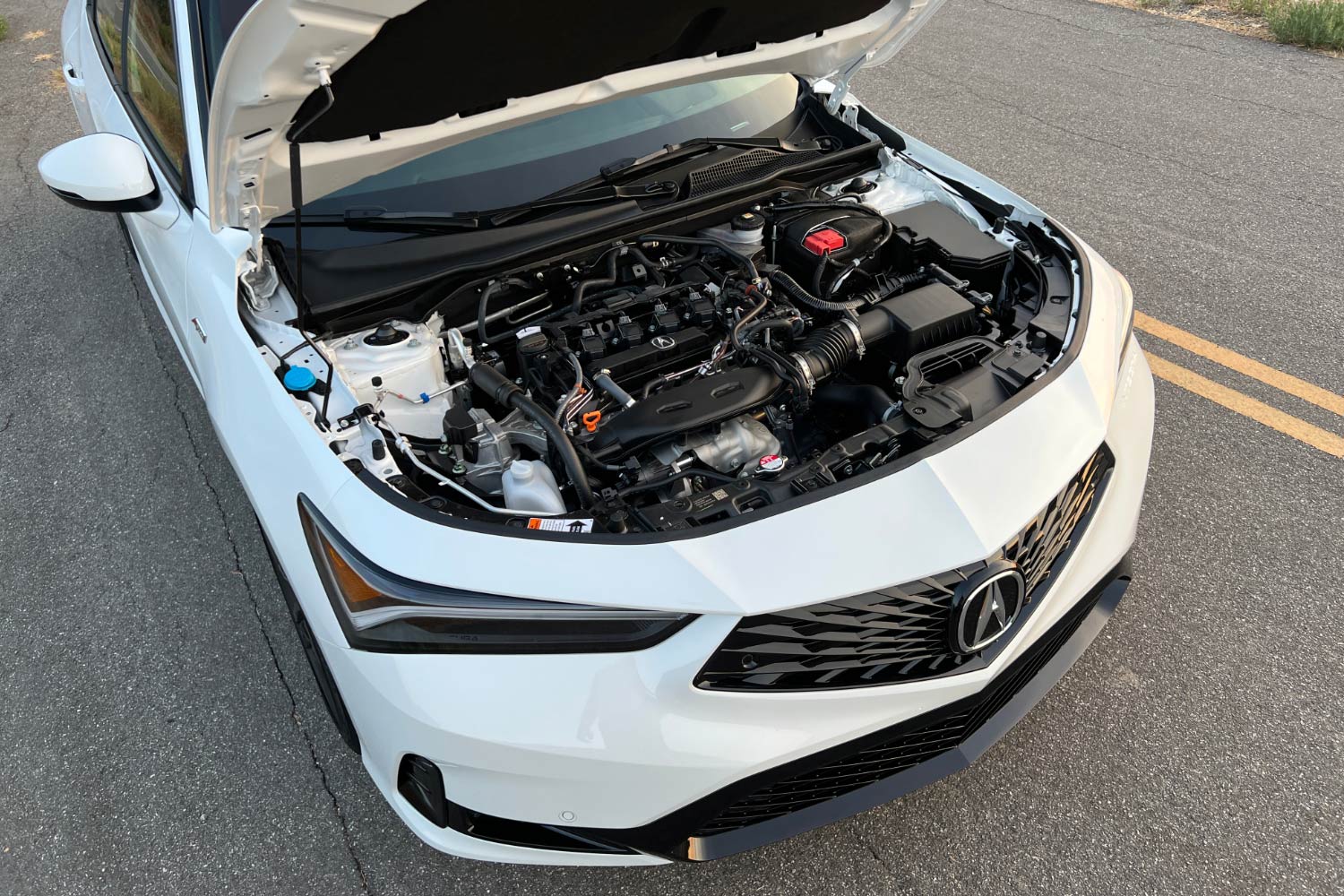 Christian Wardlaw
Christian Wardlaw
Both transmissions drive the Integra’s front wheels with power supplied by a turbocharged 1.5-liter four-cylinder engine. It makes 200 horsepower at 6,000 rpm and 192 pound-feet of torque between 1,800 rpm and 5,000 rpm, and a helical limited-slip front differential helps to get those ponies to the pavement as effectively as possible. Additionally, drivers can choose between Comfort, Normal, and Sport driving modes.
Upgrade to A-Spec trim, and the Integra has larger 18-inch wheels wrapped in 235/40 all-season tires, a quicker steering ratio, and a thicker rear stabilizer bar. The Integra A-Spec Technology further equips the car with an adaptive damping suspension and an Active Sound Control system that pipes a synthetic engine and exhaust note into the cabin. The top trim level also offers an Individual driving mode that allows you to program the engine, steering, suspension, idle-stop function, and gauge design to personal preferences.
As is typical with front-wheel-drive cars, the Integra’s weight distribution put 60 percent of the mass over the front axle and 40 percent over the rear axle. You’ll sense this when you try to take speed bumps and speed humps at anything more than the posted limit. Otherwise, though, Acura has masterfully masked the Integra’s inherent imbalance.
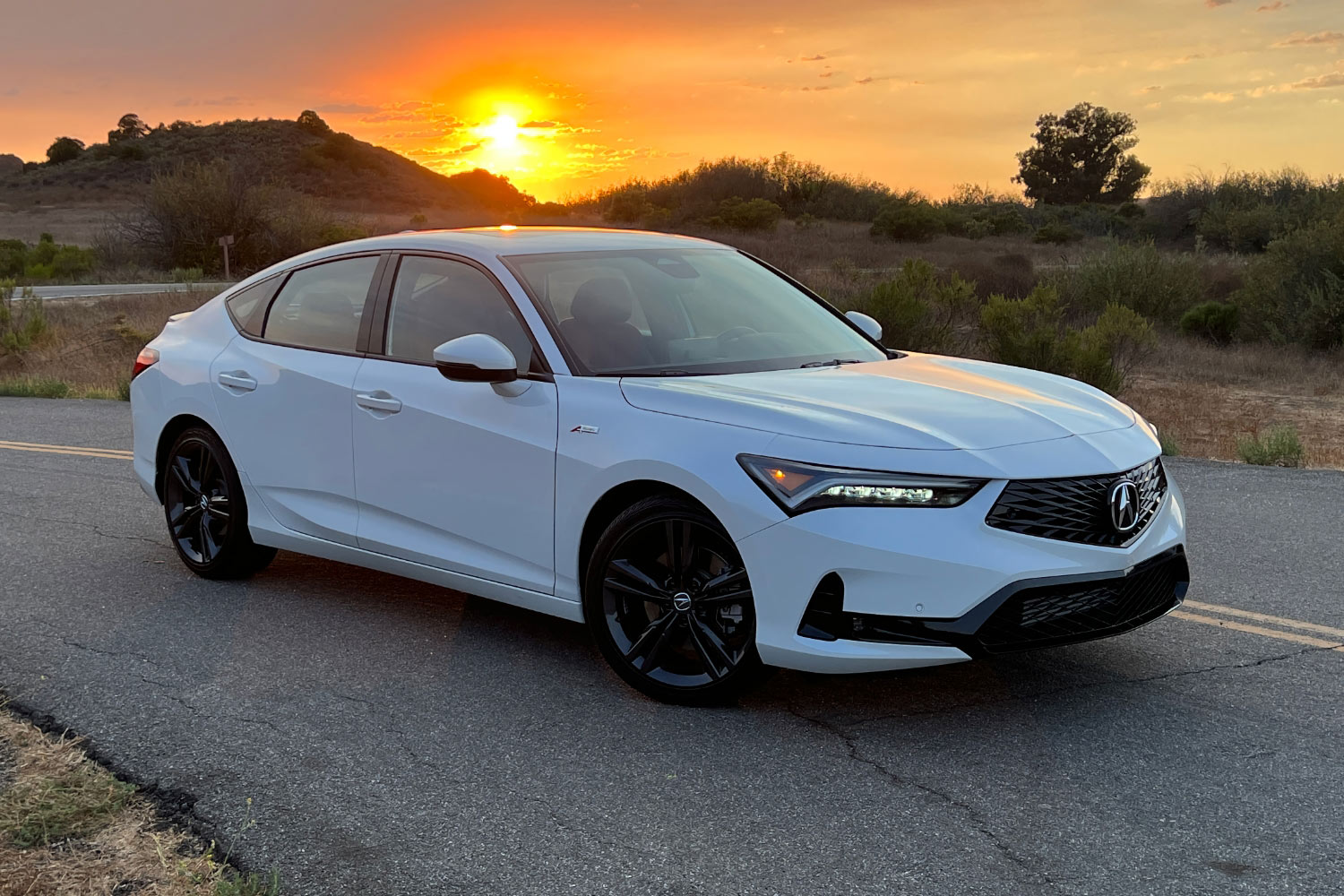 Christian Wardlaw
Christian Wardlaw
In urban and suburban driving situations, in Normal mode, the Integra is a docile traffic dicer with a comfortable ride, a silky engine, and a sweet gearbox with short, smooth, precise shifts. The car’s clutch is easy to use, too. Outward visibility isn’t great, though.
On the highway, especially on any pavement that isn’t perfect, the Integra suffers from road noise. There isn’t anything luxurious about that. But the early Integras and their subsequent replacements weren’t models of refinement in this respect, either, so you can spin this trait as another throwback to the original model.
In the mountains northwest of Los Angeles, the A-Spec Technology showed itself as a legitimate descendant of the Integras that established the name. The engine’s power isn’t overwhelming, but with either peak torque or peak horsepower available across the majority of the rev range, the car effortlessly zooms along and is so refined that it’s easy to smack into the rev limiter if you’re not careful.
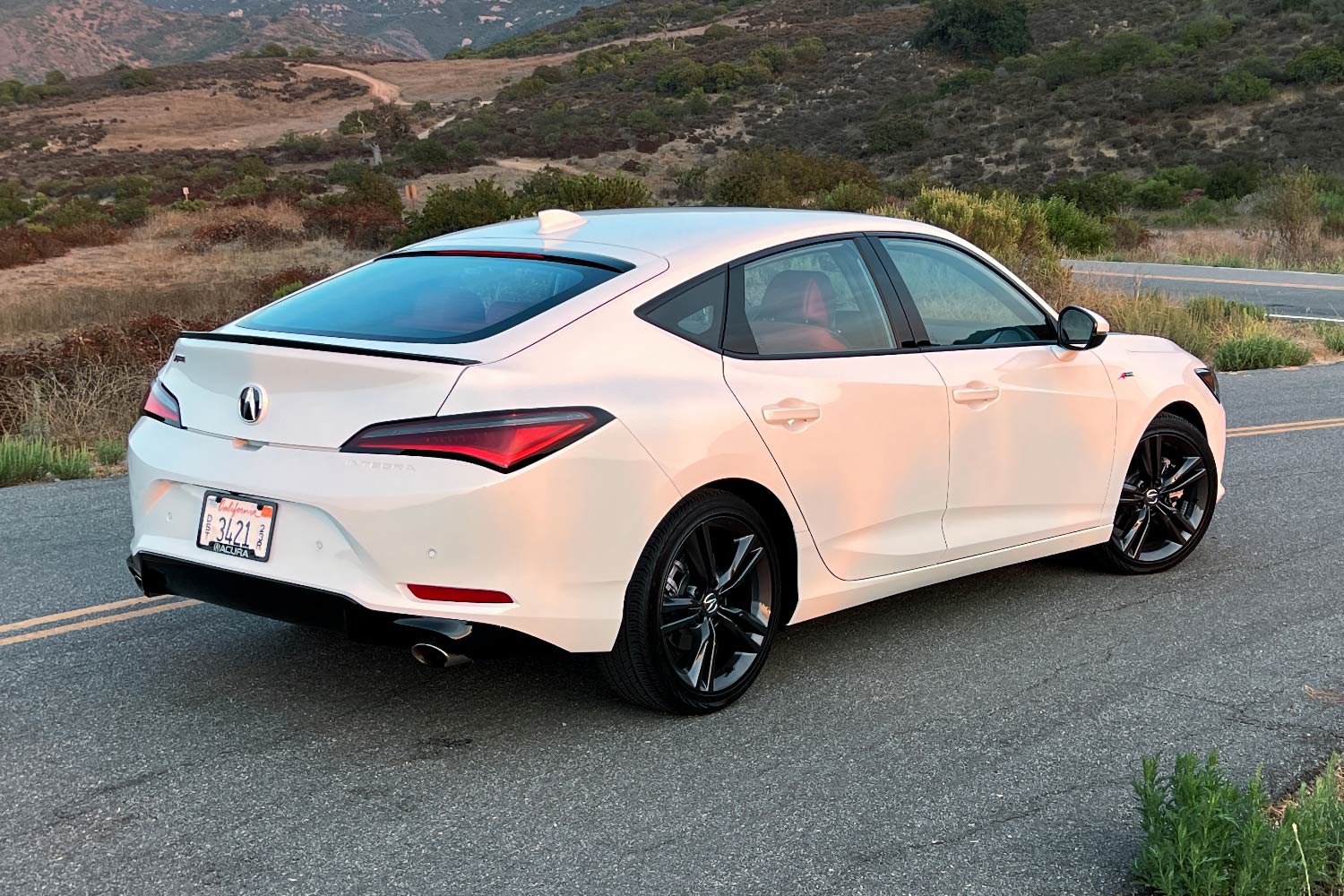 Christian Wardlaw
Christian Wardlaw
Furthermore, you can run the car solely in second and third gear on the roads laced atop the Santa Monica Mountains. When powering past apexes and out of corners, the limited-slip differential tames torque steer and quells the understeer that could bedevil a nose-heavy front-driver, and the downshift rev matching feature is absolute perfection. In my opinion, Sport mode firms up the steering too much, so I switched to the Individual driving mode that put steering effort levels on Normal with all other dynamic settings on Sport. Even at the lighter effort levels, though, I had no complaints about steering precision.
However, there were a couple of minor issues to note. Testing day was very hot for the region, with inland temperatures cresting 100 degrees and the Integra telling me it was 89 degrees at the beach. That may have caused the Continental all-season tires to grip better than usual, and they certainly squealed more than is preferable. Also, the brakes did warm and emit a subtle degree of shudder through the pedal and fade when repeatedly used.
Nevertheless, I thought the Integra A-Spec Technology was a fun car to drive. And it averaged 26.5 mpg on the testing loop, with the air conditioning blasting and its driver running the engine hard in the mountains. That’s less than the official EPA fuel economy rating of 30 mpg in combined driving, but considering the conditions and how much fun I had slinging the car to near its redline, I’m not going to complain.
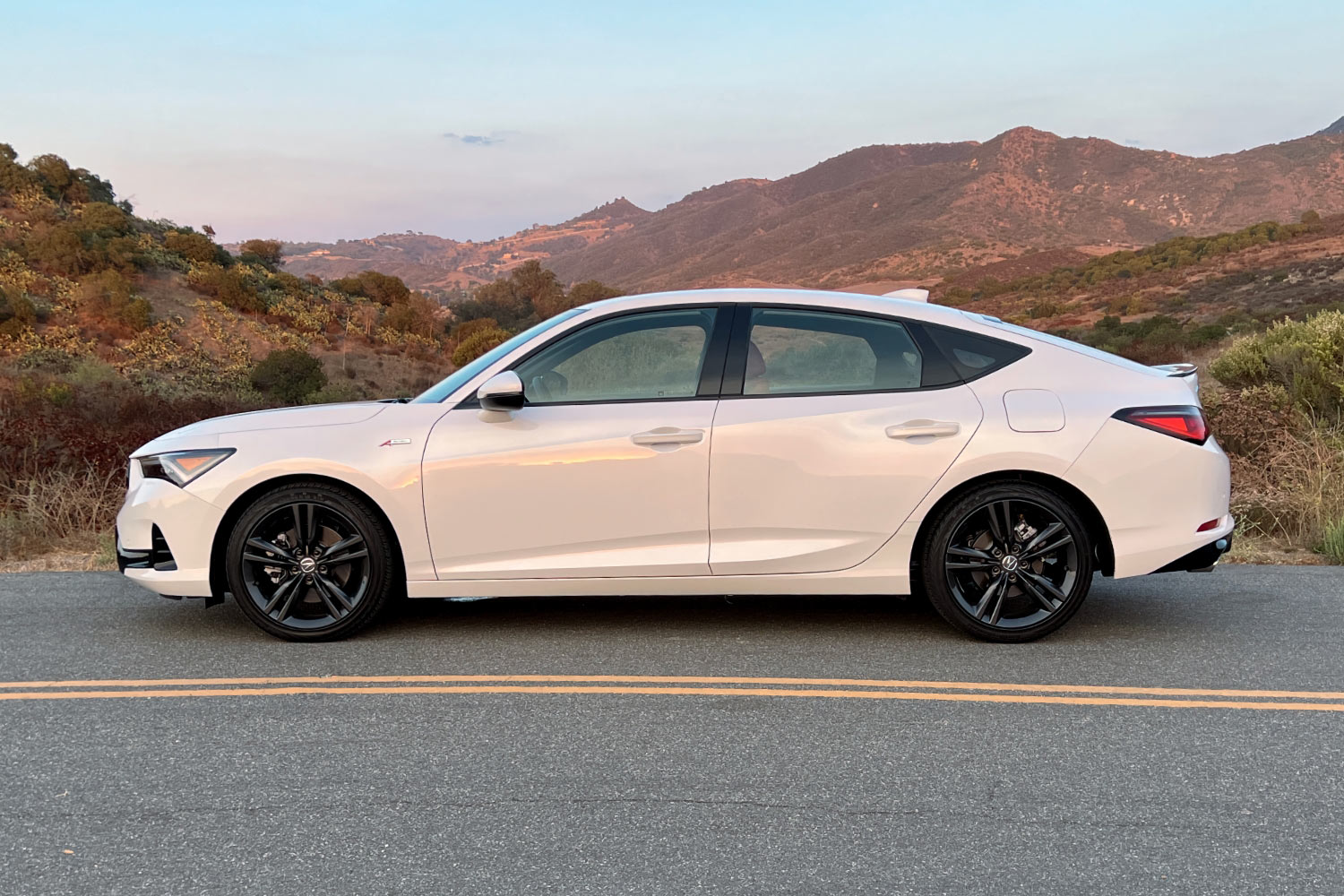 Christian Wardlaw
Christian Wardlaw
Is the 2023 Acura Integra a Good Car?
I think the new Integra is a good car. However, like the Acura ILX it replaces, it is closely based on the Honda Civic and offers few reasons to upgrade aside from its styling and unique combination of body style, powertrain, and equipment. In addition, it faces no direct rivals from premium brands, which should give the Integra an advantage. However, there are several alternatives available from mass-market brands that erode this Acura’s value equation.
When Can I Buy the 2023 Integra?
According to Acura, the new 2023 Integra will arrive at U.S. dealerships in early June of 2022. Production of the car began in Marysville, Ohio, in May of 2022.
Written by humans.
Edited by humans.
 Christian Wardlaw
Christian WardlawChris says his first word was "car." For as long as he can remember, he's been obsessed with them. The design. The engineering. The performance. And the purpose. He is a car enthusiast who loves to drive, but is most passionate about the cars, trucks, and SUVs that people actually buy. He began his career as the editor-in-chief of Edmunds.com in the 1990s, and for more than 30 years has created automotive content for CarGurus, J.D. Power, Kelley Blue Book, the New York Daily News, and others. Chris owns Speedy Daddy Media, has been contributing to Capital One Auto Navigator since 2019, and lives in California with his wife, kids, dog, and 2004 Mazdaspeed Miata.
Related articles
View more related articles